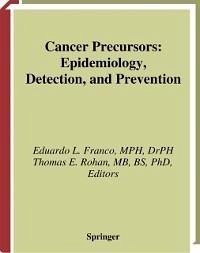Cancer Precursors is a groundbreaking, multidisciplinary text containing a comprehensive overview of methodological issues associated with the study of pre-cancerous conditions, as well as reviews of the contributions of descriptive, analytical, and molecular epidemiological research to knowledge about cancer precursors at specific anatomical locations. The research focuses on the early natural history of cancers, by helping to define the etiology of precursor lesions, improving the means of detecting them either directly or via testing of surrogate biomarkers, and by elucidating the role of remote causes leading to the early onset of such lesions.
Dieser Download kann aus rechtlichen Gründen nur mit Rechnungsadresse in A, B, BG, CY, CZ, D, DK, EW, E, FIN, F, GR, HR, H, IRL, I, LT, L, LR, M, NL, PL, P, R, S, SLO, SK ausgeliefert werden.
From the reviews:
"Drs. Franco and Rohan bring together a timely and comprehensive set of reviews describing the biologic basis of carcinogenesis, issues related to measurement and interpretation of cancer precursors, site specific precancerous conditions, and control of cancer precursors ...The book has several important strengths, most notably the wealth of current information on cancer precursors and related topics provided by an impressive cast of cancer researchers. ... it effectively provides specific and compelling reasons for studying cancer precursors, the most up-to-date and comprehensive collection of reviews on the topic, and a realistic picture of the complexities facing research of cancer precursors." -American Journal of Epidemiology
"In this book, Drs. Franco and Rohan have succeeded in preparing a comprehensive, timely, and critical review of the substantial progress that has been made in our understanding of cancer precursors. They have enlisted experts in the field who have contributed authoritative chapters to a wide variety of cancers with emphasis on the etiology and natural history, including the role of environmental and heritable factor that provoke normal cells to undergo malignant transformation. Epidemiologic data are linked whenever possible to molecular as well as clasical cellular pathology, providing a fuller understanding of the casual events and mechanisms that initiate the carcinogenic process."
-From the Foreward by Joseph F. Fraumeni, Jr., M.D., M.S.
Director, Division of Cancer Epidemiology and Genetics
National Cancer Institute
National Institutes of Health
Rockville, MD
"This first edition text presents epidemiological data on the importance of precursor lesions at all the major anatomical sites. ... The strongest and most interesting section of the book is part three, which deals with precursor lesions at each of the important anatomical sites. ...The most interesting chapters were those that sought to integrate the epidemiology, pathology and molecular biology of the disease ... . Overall, I found this book made interesting reading and certainly some chapters would serve as an excellent reference text." (R Ward, Cancer Forum, Vol. 26 (3), 2002)
"Drs. Franco and Rohan bring together a timely and comprehensive set of reviews describing the biologic basis of carcinogenesis, issues related to measurement and interpretation of cancer precursors, site specific precancerous conditions, and control of cancer precursors ...The book has several important strengths, most notably the wealth of current information on cancer precursors and related topics provided by an impressive cast of cancer researchers. ... it effectively provides specific and compelling reasons for studying cancer precursors, the most up-to-date and comprehensive collection of reviews on the topic, and a realistic picture of the complexities facing research of cancer precursors." -American Journal of Epidemiology
"In this book, Drs. Franco and Rohan have succeeded in preparing a comprehensive, timely, and critical review of the substantial progress that has been made in our understanding of cancer precursors. They have enlisted experts in the field who have contributed authoritative chapters to a wide variety of cancers with emphasis on the etiology and natural history, including the role of environmental and heritable factor that provoke normal cells to undergo malignant transformation. Epidemiologic data are linked whenever possible to molecular as well as clasical cellular pathology, providing a fuller understanding of the casual events and mechanisms that initiate the carcinogenic process."
-From the Foreward by Joseph F. Fraumeni, Jr., M.D., M.S.
Director, Division of Cancer Epidemiology and Genetics
National Cancer Institute
National Institutes of Health
Rockville, MD
"This first edition text presents epidemiological data on the importance of precursor lesions at all the major anatomical sites. ... The strongest and most interesting section of the book is part three, which deals with precursor lesions at each of the important anatomical sites. ...The most interesting chapters were those that sought to integrate the epidemiology, pathology and molecular biology of the disease ... . Overall, I found this book made interesting reading and certainly some chapters would serve as an excellent reference text." (R Ward, Cancer Forum, Vol. 26 (3), 2002)


